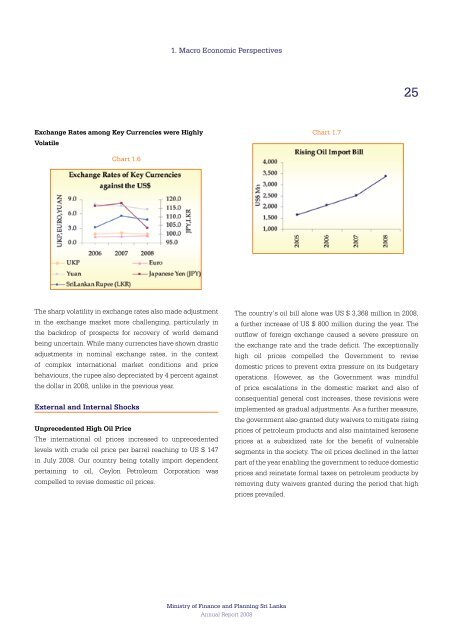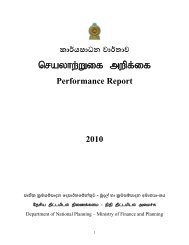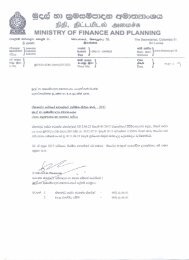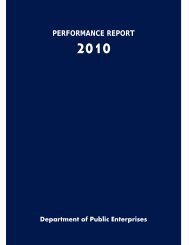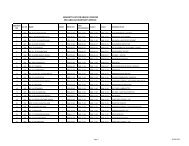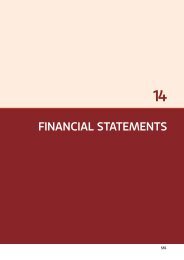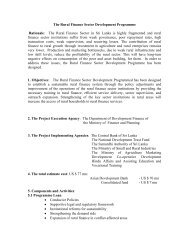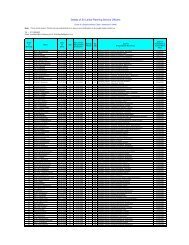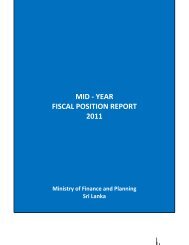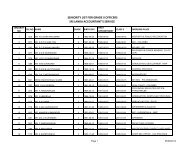- Page 1: 2008 Annual Report Ministry of Fina
- Page 4 and 5: 2 This Report is Published in terms
- Page 6 and 7: 4 Heads of Treasury Departments (as
- Page 8 and 9: 6 Heads of Statutory Boards / State
- Page 10 and 11: 8 Contents Chapter 1 - Macro Econom
- Page 12 and 13: 10 Contents Contd. Table 3.9 - Key
- Page 14 and 15: 12 Contents Contd. Table 7.8 - Valu
- Page 16 and 17: 14 Contents Contd. Chart 3.1 - Accu
- Page 18 and 19: 16 Sri Lanka at a Glance - 2008 KEY
- Page 20 and 21: 18 Sri Lanka at a Glance - 2008 Con
- Page 22 and 23: 1. Macro Economic Perspectives 20 E
- Page 24 and 25: 1. Macro Economic Perspectives 22 T
- Page 28 and 29: 1. Macro Economic Perspectives 26 C
- Page 30 and 31: 1. Macro Economic Perspectives 28 T
- Page 32 and 33: 1. Macro Economic Perspectives 30 G
- Page 34 and 35: 1. Macro Economic Perspectives 32 M
- Page 36 and 37: 1. Macro Economic Perspectives 34 T
- Page 38 and 39: 1. Macro Economic Perspectives 36 W
- Page 40 and 41: 1. Macro Economic Perspectives 38 B
- Page 42 and 43: 1. Macro Economic Perspectives 40 B
- Page 44 and 45: 1. Macro Economic Perspectives 42 L
- Page 46 and 47: 1. Macro Economic Perspectives 44 i
- Page 48 and 49: 2. Fiscal Developments - 2008 46 An
- Page 50 and 51: 2. Fiscal Developments - 2008 48 Ta
- Page 52 and 53: 2. Fiscal Developments - 2008 50 Go
- Page 54 and 55: 2. Fiscal Developments - 2008 52
- Page 56 and 57: 2. Fiscal Developments - 2008 54 Ta
- Page 58 and 59: 2. Fiscal Developments - 2008 56 Bo
- Page 60 and 61: 2. Fiscal Developments - 2008 58 Sp
- Page 62 and 63: 2. Fiscal Developments - 2008 60
- Page 64 and 65: 2. Fiscal Developments - 2007 62 Ta
- Page 66 and 67: 2. Fiscal Developments - 2008 64 Ta
- Page 68 and 69: 2. Fiscal Developments - 2008 66 Ta
- Page 70 and 71: 2. Fiscal Developments - 2008 68 Bo
- Page 72 and 73: 2. Fiscal Developments - 2008 70 Tr
- Page 74 and 75: 2. Fiscal Developments - 2008 72 Ta
- Page 76 and 77:
2. Fiscal Developments - 2008 74 Th
- Page 78 and 79:
2. Fiscal Developments - 2008 76 Ta
- Page 80 and 81:
2. Fiscal Developments - 2008 78 Ta
- Page 82 and 83:
2. Fiscal Developments - 2008 80 Ta
- Page 84 and 85:
2. Fiscal Developments - 2008 82 20
- Page 86 and 87:
2. Fiscal Developments - 2008 84 Bo
- Page 88 and 89:
2. Fiscal Developments - 2008 86 Bo
- Page 90 and 91:
2. Fiscal Developments - 2008 88 Bo
- Page 92 and 93:
2. Fiscal Developments - 2008 90 Me
- Page 94 and 95:
2. Fiscal Developments - 2008 92 Bo
- Page 96 and 97:
2. Fiscal Developments - 2008 94 Bo
- Page 98 and 99:
2. Fiscal Developments - 2008 96 Bo
- Page 100 and 101:
2. Fiscal Developments - 2008 98 Bo
- Page 102 and 103:
2. Fiscal Developments - 2008 100 B
- Page 104 and 105:
2. Fiscal Developments - 2008 102 B
- Page 106 and 107:
2. Fiscal Developments - 2008 104 B
- Page 108 and 109:
2. Fiscal Developments - 2008 106 I
- Page 110 and 111:
2. Fiscal Developments - 2008 108 B
- Page 112 and 113:
2. Fiscal Developments - 2008 110 B
- Page 114 and 115:
2. Fiscal Developments - 2008 112 B
- Page 116 and 117:
2. Fiscal Developments - 2008 114 P
- Page 118 and 119:
2. Fiscal Developments - 2008 116 B
- Page 120 and 121:
2. Fiscal Developments - 2008 118 B
- Page 122 and 123:
2. Fiscal Developments - 2008 120 B
- Page 124 and 125:
2. Fiscal Developments - 2008 122 B
- Page 126 and 127:
2. Fiscal Developments - 2008 124 T
- Page 128 and 129:
2. Fiscal Developments - 2008 126 T
- Page 130 and 131:
2. Fiscal Developments - 2008 128 T
- Page 132 and 133:
2. Fiscal Developments - 2008 130 T
- Page 134 and 135:
2. Fiscal Developments - 2008 132 T
- Page 136 and 137:
2. Fiscal Developments - 2008 134 D
- Page 138 and 139:
2. Fiscal Developments - 2008 136 T
- Page 140 and 141:
138 Ministry of Finance and Plannin
- Page 142 and 143:
3. Performance of Public Enterprise
- Page 144 and 145:
3. Performance of Public Enterprise
- Page 146 and 147:
3. Performance of Public Enterprise
- Page 148 and 149:
3. Performance of Public Enterprise
- Page 150 and 151:
3. Performance of Public Enterprise
- Page 152 and 153:
3. Performance of Public Enterprise
- Page 154 and 155:
3. Performance of Public Enterprise
- Page 156 and 157:
3. Performance of Public Enterprise
- Page 158 and 159:
3. Performance of Public Enterprise
- Page 160 and 161:
3. Performance of Public Enterprise
- Page 162 and 163:
3. Performance of Public Enterprise
- Page 164 and 165:
3. Performance of Public Enterprise
- Page 166 and 167:
3. Performance of Public Enterprise
- Page 168 and 169:
3. Performance of Public Enterprise
- Page 170 and 171:
3. Performance of Public Enterprise
- Page 172 and 173:
3. Performance of Public Enterprise
- Page 174 and 175:
3. Performance of Public Enterprise
- Page 176 and 177:
4. Reform Initiatives 174 An Overvi
- Page 178 and 179:
4. Reform Initiatives 176 also prov
- Page 180 and 181:
4. Reform Initiatives 178 Finance/R
- Page 182 and 183:
4. Reform Initiatives 180 Environme
- Page 184 and 185:
4. Reform Initiatives 182 Pradeshiy
- Page 186 and 187:
4. Reform Initiatives 184 SALIENT F
- Page 188 and 189:
4. Reform Initiatives 186 The Credi
- Page 190 and 191:
4. Reform Initiatives 188 Name of t
- Page 192 and 193:
4. Reform Initiatives 190 Project P
- Page 194 and 195:
4. Reform Initiatives 192 TERMS OF
- Page 196 and 197:
4. Reform Initiatives 194 Table 4.8
- Page 198 and 199:
4. Reform Initiatives 196 grounds,
- Page 200 and 201:
5. Foreign Financing of the Budget
- Page 202 and 203:
5. Foreign Financing of the Budget
- Page 204 and 205:
5. Foreign Financing of the Budget
- Page 206 and 207:
5. Foreign Financing of the Budget
- Page 208 and 209:
5. Foreign Financing of the Budget
- Page 210 and 211:
5. Foreign Financing of the Budget
- Page 212 and 213:
5. Foreign Financing of the Budget
- Page 214 and 215:
5. Foreign Financing of the Budget
- Page 216 and 217:
5. Foreign Financing of the Budget
- Page 218 and 219:
5. Foreign Financing of the Budget
- Page 220 and 221:
5. Foreign Financing of the Budget
- Page 222 and 223:
5. Foreign Financing of the Budget
- Page 224 and 225:
5. Foreign Financing of the Budget
- Page 226 and 227:
5. Foreign Financing of the Budget
- Page 228 and 229:
5. Foreign Financing of the Budget
- Page 230 and 231:
5. Foreign Financing of the Budget
- Page 232 and 233:
5. Foreign Financing of the Budget
- Page 234 and 235:
5. Foreign Financing of the Budget
- Page 236 and 237:
5. Foreign Financing of the Budget
- Page 238 and 239:
6. A Sectoral Perspective 236 An Ov
- Page 240 and 241:
6. A Sectoral Perspective 238 Table
- Page 242 and 243:
6. A Sectoral Perspective 240 Agric
- Page 244 and 245:
6. A Sectoral Perspective 242 Shift
- Page 246 and 247:
6. A Sectoral Perspective 244 Table
- Page 248 and 249:
6. A Sectoral Perspective 246 Table
- Page 250 and 251:
6. A Sectoral Perspective 248 Table
- Page 252 and 253:
6. A Sectoral Perspective 250 Lives
- Page 254 and 255:
6. A Sectoral Perspective 252 In te
- Page 256 and 257:
6. A Sectoral Perspective 254 Box 6
- Page 258 and 259:
6. A Sectoral Perspective 256 Distr
- Page 260 and 261:
6. A Sectoral Perspective 258 the P
- Page 262 and 263:
7. Development Finance 260 An Overv
- Page 264 and 265:
7. Development Finance 262 Table 7.
- Page 266 and 267:
7. Development Finance 264 Krushi N
- Page 268 and 269:
7. Development Finance 266 Crushi N
- Page 270 and 271:
7. Development Finance 268 Agro Liv
- Page 272 and 273:
7. Development Finance 270 Chart 7.
- Page 274 and 275:
7. Development Finance 272 The tota
- Page 276 and 277:
7. Development Finance 274 Small an
- Page 278 and 279:
7. Development Finance 276 It is al
- Page 280 and 281:
7. Development Finance 278 SMERDP N
- Page 282 and 283:
7. Development Finance 280 (RFSDP)
- Page 284 and 285:
7. Development Finance 282 • Pape
- Page 286 and 287:
7. Development Finance 284 appointe
- Page 288 and 289:
8. Financial Statements - 2008 286
- Page 290 and 291:
8. Financial Statements - 2008 288
- Page 292 and 293:
8. Financial Statements - 2008 290
- Page 294 and 295:
8. Financial Statements - 2008 292
- Page 296 and 297:
8. Financial Statements - 2008 294
- Page 298 and 299:
8. Financial Statements - 2008 296
- Page 300 and 301:
8. Financial Statements - 2008 298
- Page 302 and 303:
8. Financial Statements - 2008 300
- Page 304 and 305:
8. Financial Statements - 2008 302
- Page 306 and 307:
8. Financial Statements - 2008 304
- Page 308 and 309:
8. Financial Statements - 2008 306
- Page 310 and 311:
8. Financial Statements - 2008 308
- Page 312 and 313:
8. Financial Statements - 2008 310
- Page 314 and 315:
8. Financial Statements - 2008 312
- Page 316 and 317:
8. Financial Statements - 2008 314
- Page 318 and 319:
8. Financial Statements - 2008 316
- Page 320 and 321:
8. Financial Statements - 2008 318
- Page 322 and 323:
8. Financial Statements - 2008 320
- Page 324 and 325:
8. Financial Statements - 2008 322
- Page 326 and 327:
8. Financial Statements - 2008 324
- Page 328 and 329:
8. Financial Statements - 2008 326
- Page 330 and 331:
328 8. Financial Statements - 2008
- Page 332 and 333:
330 8. Financial Statements - 2008
- Page 334:
8. Financial Statements - 2008 332


